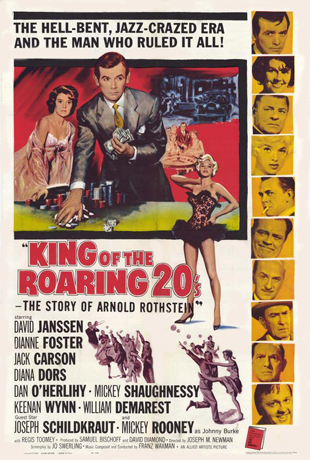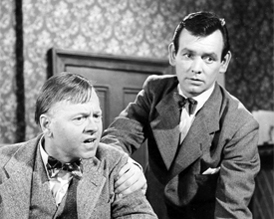
 |
|
|
|
The Warner Archive Collection is doing genre fans a big service by issuing high quality widescreen discs of some late-1950s gangster films that haven't been seen in a long time. 1959's Al Capone and especially the television series The Untouchables kicked off a big revival of gangland sagas at the end of the Eisenhower years. We're told that the boom was partly inspired by the fact that filmmakers could now drop the "protect the innocent" facade and use the real names of famous criminals. The movies weren't necessarily true to the historical record, but from about 1957 on, marquees sprouted up touting the names Legs Diamond, Mad Dog Coll, Machine Gun Kelly and Baby Face Nelson. The adventures of these '20s and '30s crooks provided subjects for directors like Burt Balaban, Richard Wilson and even Roger Corman. 1961's King of the Roaring 20's: The Story of Arnold Rothstein comes at the end of the cycle. It's a biopic about one of the wealthiest figures in the New York underworld between 1910 and his death in 1928. A role model for aspiring Jewish hoods, Rothstein was an immaculate dresser and style-setter. Highly intelligent and very good with money, he ran his rackets with extreme caution. Rothstein was also politically fixed with the corrupt Tammany Hall group of politicians. The vacuum left by his absence caused a major turnover in city politics as well as the underworld. King of the Roaring 20's was directed by the unheralded but prolific Joseph M. Newman (711 Ocean Drive; This Island Earth) and stars the then up 'n' coming leading man David Janssen. Critics pointed to the fact that Janssen is too young for the Rothstein role, but that's a minor issue in a screenplay that fictionalizes and simplifies most of the facts. The script is the last writing credit for the legendary Jo Swerling. Young punk Arnie Rothstein earns the ire of his father (Joseph Schildkraut) for running a juvenile gang and profiting from gambling while others take the risk. He stays loyal to his street buddy Johnny Burke (Mickey Rooney) as they organize "floating" games that bring in big money. But Arnold's ambition to run an illegal casino is curbed by City Hall crook Big Tim O'Brien (Jack Carson, in his last film) and crooked cop Phil Butler (Dan O'Herlihy). Arnold is forced by Big Tim to take as a partner the stupid Jim Kelly (Mickey Shaughnessy), and drop Johnny Burke. As his casino brings in ever-higher profits, Rothstein quietly manipulates horse races and becomes even richer. He sweeps showgirl Carolyn Green (Dianne Foster, The Brothers Rico) off her feet, and then neglects her in favor of his business interests. When Big Tim forces Arnold to split his profits 50-50 with the greedy, spiteful Phil Butler, the gambler arranges a complex trap to frame the detective for murder ... the murder of poor Johnny Burke. 
Arnold Rothstein didn't come from a poor family. His rise to wealth was quite different than portrayed here, and so was his undoing. The real Rothstein was a calculating cold fish known as "The Brain" and "The Big Bankroll"; he reportedly bought associates and lovers the way he bought the cops. For an accurate image of the man, the portrait given in Budd Boetticher's The Rise and Fall of Legs Diamond is more to the point. By the mid-1920s Arnold spent a lot of his time in his swank apartment where his bodyguards could protect him. But the movie does capture Rothstein's Borgia-like finesse in "business". He gets rid of the erratic, dumb hood Jim Kelly by buying him out with his own money. The Machiavellian trap he sets for Phil Butler is thought out three steps in advance, like a chess move. Realizing that his oldest friend knows too much about their shared past, Rothstein coldly sacrifices him in the same maneuver. All of this makes King of the Roaring 20's different from traditional gangland pictures. Although clubs are raided and some shooting takes place, the emphasis is on politics in a corrupt environment that makes little distinction between illegal activities and big business. Rothstein is in the business of "wealth enhancement", and his methods aren't all that different from Wall Street. He doesn't have people killed, but he can arrange such crimes without exposing himself to legal scrutiny. 1 The Allied Artists release isn't cheap but it cheats somewhat on period touches. The cars look real enough but the film is shot on unimpressive back-lot street sets, and the wardrobe makes little attempt to be authentic. Joseph M. Newman directs with calm assurance, focusing on the acting. Janssen is a cool customer able to imply the workings of a supreme poker player behind his most casual remark. Dianne Foster is very good as the woman he woos, who falls apart when her husband ignores her. Jack Carson makes a good impression as the crooked city official, even though his office is a cheap set and his clothes say nothing about his character. Irish actor Dan O'Herlihy is likewise fine as the vindictive, gloating Phil Butler. Interestingly, Janssen, Carson and O'Herlihy's characters seem a dry run for classic hoods in more modern crime pictures. O'Herlihy is a precursor of Sterling Hayden's rotten cop in Coppola's The Godfather, while David Janssen as Rothstein reminds us strongly of Robert De Niro in Scorsese's Casino. 
The smaller parts stand out as well. Keenan Wynn, Regis Toomey and Diana Dors appear only briefly, but William Demarest is good as a Rothstein associate, and Robert Ellenstein quite good as his primary casino manager. The welcome surprise is a truly fine performance from Mickey Rooney. The multi-talented actor sublimates himself to his character role and neither overacts nor attempts to steal scenes. His Johnny Burke has several emotional highlights, striking a contrast with Arnold's cool cucumber. The result is that Rooney lends the fairly cold film some needed heart. After seeing him in this movie and as a wonderfully manic soldier in Operation Mad Ball, I'm looking forward to more great Rooney discoveries ... perhaps the difficult-to-see Baby Face Nelson, by Don Siegel? Gangster pictures continued apace (especially in Europe) but took a back seat for a few years to make room for the 007 superspy craze. Then in 1967 it exploded again, in three major directions. Arthur Penn's retro-fashion radical chic Bonnie & Clyde reinvented Depression-era bandits as anti-establishment icons. John Boorman brought Antonioni / Resnais mind games to a brutal caper picture with Point Blank. And Roger Corman encapsulated and resolved the gangland bio-pic style with his docu-like The St. Valentine's Day Massacre. 
The Warner Archive Collection DVD-R of King of the Roaring 20's is a perfect enhanced widescreen transfer of this nicely shot B&W attraction. Franz Waxman provides the music score, which surprisingly is only intermittently memorable, considering that Waxman began by composing jazzy tunes in the 1920s. No extras are included.
On a scale of Excellent, Good, Fair, and Poor, Footnote:
1. Historians are now fairly certain that Arnold Rothstein did indeed fix the 1919 World series, the baseball scandal commemorated in John Sayles' Eight Men Out. The event is referenced in King of the Roaring 20's in an offhand comment at the racetrack.
Reviews on the Savant main site have additional credits information and are often updated and annotated with reader input and graphics. Also, don't forget the 2010 Savant Wish List. T'was Ever Thus.
Review Staff | About DVD Talk | Newsletter Subscribe | Join DVD Talk Forum |
| ||||||||||||||||||